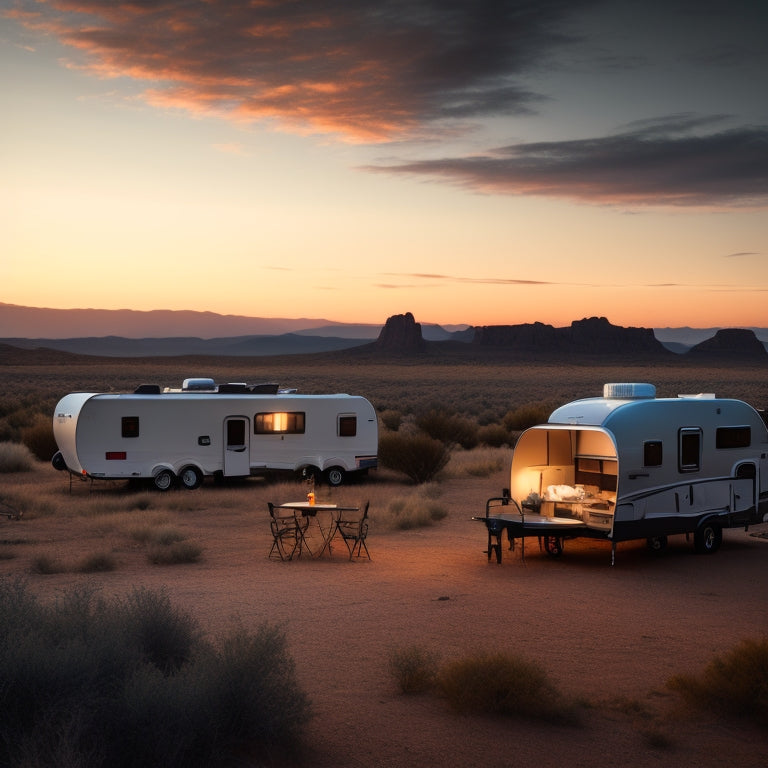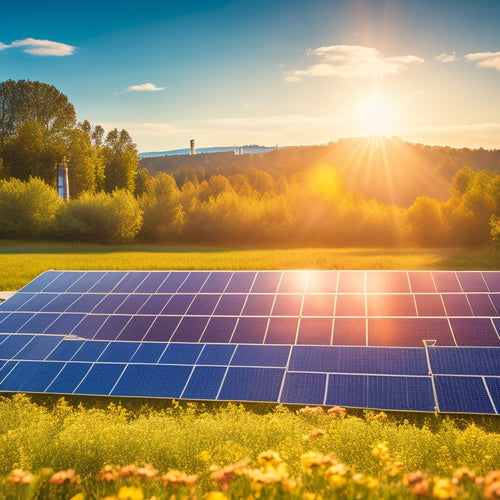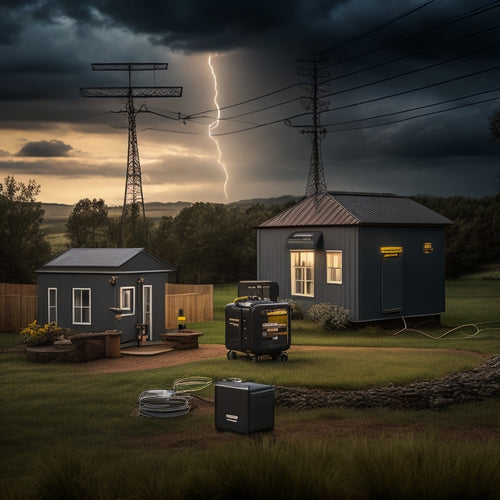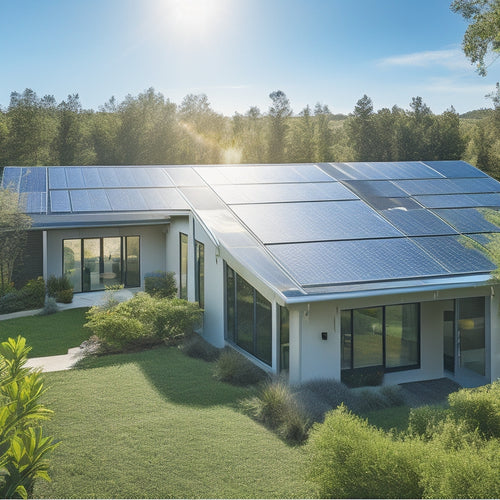
RV Power Solutions for Off-Grid Living
Share
You can achieve off-grid RV living by utilizing the power of portable solar panels, which provide eco-friendly battery recharging. To guarantee energy independence, accurately size your solar system, evaluating peak sun hours to determine necessary wattage. A well-chosen solar kit, complete with a compatible power inverter, deep cycle batteries, and charge controller, will get you started. Proper installation, regular battery maintenance, and optimizing solar panel output through adjusted tilt and orientation will maximize your energy harvest. By understanding these essential components and overcoming common challenges, you'll be well on your way to enjoying the freedom of off-grid living - and there's more to investigate to ensure your system runs smoothly.
Key Takeaways
- Accurate sizing of solar systems and assessing peak sun hours ensures energy independence while traveling off-grid.
- Portable solar panels provide eco-friendly battery recharging, and choosing the right solar kit is essential for effective power generation.
- A well-maintained battery bank with proper care and monitoring is crucial for reliable off-grid power storage.
- Energy independence can be achieved by reducing reliance on generators and public hookups, and instead utilizing renewable energy sources.
- Maximizing solar panel output through optimizing angle and orientation, direct sunlight exposure, and seasonal adjustments enhances energy harvest.
Understanding Portable Solar Panels
When venturing into the world of RV power solutions, portable solar panels emerge as an indispensable component, offering a reliable and eco-friendly means to recharge your batteries.
As you investigate solar panel types, you'll find monocrystalline and polycrystalline options, each with its own efficiency ratings and price points. For peak performance, consider the wattage and voltage requirements of your RV's electrical system.
Accurate sizing of the solar system enables energy independence while traveling, and it's vital to assess peak sun hours in the location to determine required solar wattage.
When installing your portable solar panel, guarantee a secure and level surface, and consider using a tilt-adjustable mount to maximize energy collection.
Additionally, follow installation tips such as avoiding shading, using a charge controller, and monitoring your system's performance to guarantee efficient energy production.
Benefits of Off-Grid Power Systems
Embracing off-grid power systems revolutionizes your RV experience, granting you the freedom to roam untethered from the grid. By utilizing renewable energy, you'll enjoy numerous benefits that enhance your off-grid excursions.
Achieving grid independence provides uninterrupted power during outages grid resilience and allows for flexible energy generation, storage, and usage. Additionally, well-designed storage solutions enhance property value and appeal to eco-conscious buyers.
-
Cost savings: Reduce your reliance on fuel-guzzling generators and public hookups, saving you money on energy costs.
-
Environmental impact: Lower your carbon footprint and contribute to a cleaner environment by using renewable energy sources.
-
Energy independence: Break free from the grid and generate your own power, ensuring you're always energized and connected.
-
Lifestyle flexibility: Off-grid power systems provide the freedom to camp in remote areas, stay longer, and venture further.
-
Emergency preparedness: Be prepared for unexpected outages or natural disasters with a reliable off-grid power system.
Choosing the Right Solar Kit
Three key factors determine the effectiveness of your off-grid power system: the quality of your solar panels, the capacity of your battery bank, and the efficiency of your charge controller.
When choosing a solar kit, consider the type that suits your needs. It's crucial to verify the kit is compatible with local building codes Top-Rated DIY Solar Kits and has an extensive warranty for at least 25 years.
There are three primary solar kit types: roof-mounted, portable, and folding. Roof-mounted kits are ideal for permanent installations, while portable and folding kits offer flexibility.
When selecting a kit, confirm it's compatible with your RV's electrical system.
Follow installation tips, such as positioning panels at a peak angle and securing them to withstand wind and weather conditions.
Proper installation and maintenance will maximize your solar kit's performance, providing reliable off-grid power for your RV excursions.
Essential Components for RV Systems
How do you guarantee a seamless change to off-grid power in your RV?
It's vital to focus on the essential components that facilitate energy efficiency and reliability. These components work together to provide a stable power supply, allowing you to enjoy off-grid living without interruptions.
-
Power Inverters: Convert DC power from your solar panels or batteries to AC power for your appliances.
-
Deep Cycle Batteries: Store excess energy generated by your solar panels during the day for later use.
-
Charge Controllers: Regulate the flow of energy from your solar panels to your batteries, preventing overcharging or undercharging.
-
Monitoring Systems: Track your energy production, consumption, and storage to optimize your system's performance.
-
Distribution Panels: Organize and connect your electrical components, making it easier to manage your power distribution.
Maximizing Solar Panel Output
Optimizing your solar panel array's angle and orientation is crucial for maximizing energy harvest.
You'll want to guarantee your panels receive direct sunlight for the longest period possible, as shading effects can greatly reduce energy output. To achieve this, adjust your solar panel orientation to match the sun's seasonal movements.
During summer, tilt your panels at a steeper angle to capture more energy, and flatten them during winter to reduce snow accumulation.
Additionally, consider the surrounding environment and avoid installing panels near trees or buildings that could cast shadows.
Battery Maintenance and Care
Reliability hinges on the delicate balance of your RV's power system, and battery maintenance is a critical component of this equilibrium.
You need to verify your batteries are in top condition to maximize their lifespan and performance. Here's what you need to do:
-
Monitor your battery state of charge (SOC) regularly to prevent over-discharging, which can reduce battery lifespan.
-
Choose a charger that's compatible with your battery type to prevent damage and verify efficient charging.
-
Keep your batteries clean and dry to prevent corrosion and electrical shorts.
-
Avoid deep-cycling your batteries, as this can reduce their lifespan.
-
Store your batteries in a cool, dry place when not in use to slow down self-discharge.
Overcoming Common Challenges
Complexity often lurks beneath the surface of your RV's power system, waiting to disrupt your expedition. To overcome common challenges, you'll need to address power storage, energy efficiency, and inverter selection. Effective load management and backup solutions are also vital. Consider the environmental impact of your system and guarantee compatibility with your RV's unique requirements.
| Challenge | Solution | Considerations |
|---|---|---|
| Insufficient power storage | Upgrade to high-capacity batteries | Compatibility with existing system |
| Inefficient energy use | Install energy-efficient appliances | Load management and monitoring |
| Inverter selection | Choose an inverter with high surge capacity | Compatibility with appliances and system |
| Backup power solutions | Invest in a reliable generator or solar panel | Environmental impact and noise level |
| System incompatibility | Consult with a professional to guarantee system integration | Budget and timeline constraints |
Frequently Asked Questions
Can I Install Solar Panels on My Rv's Roof Myself?
You can attempt a DIY installation of solar panels on your RV's roof, but be aware that it requires precise measurement, correct fastening, and proper electrical connections; choose suitable solar panel types, such as monocrystalline or polycrystalline, for peak performance.
How Do I Handle Low Sunlight During Winter Months?
During winter's low sunlight, you'll prioritize solar panel efficiency by angling them ideally and ensuring cleanliness; meanwhile, focus on battery maintenance by monitoring temperature, state of charge, and equalization to maximize storage capacity.
Are RV Solar Power Systems Compatible With All Batteries?
You'll find that RV solar power systems can be compatible with most batteries, but it's essential to take into account the type of solar panels and controllers, as well as the battery's chemistry, voltage, and capacity to guarantee seamless integration.
Do I Need a License to Install an Off-Grid Power System?
You'll typically need to comply with off-grid regulations, obtaining installation permits before setting up an off-grid power system, as local authorities govern electrical installations, ensuring safety and code adherence, so it's crucial to research and secure necessary permits prior to installation.
Can I Use a Generator in Conjunction With Solar Power?
You can combine a generator with solar power, using inverter/chargers to manage power flow; choose between portable, standby, or inverter generators, considering factors like noise, fuel efficiency, and power management systems to optimize your hybrid setup.
Related Posts
-

Advantages of Solar Generating Systems Over Traditional Energy
Solar generating systems provide several key advantages over traditional energy sources. You'll experience lower long...
-

Key Components of a Reliable Emergency Power Supply System
A reliable emergency power supply system requires several key components. You need proven performance metrics to guar...
-

Installing Metal Solar Roofs for Maximum Energy Efficiency
Installing metal solar roofs can drastically enhance your home's energy efficiency and durability. These roofs withst...


